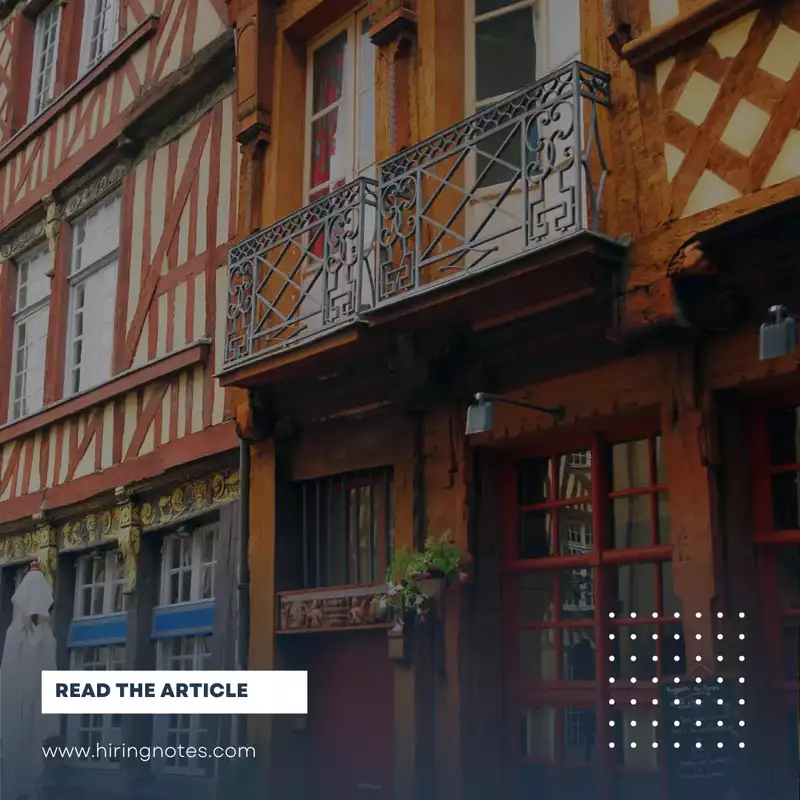Recruitment Agencies
The recruitment market has significant regional specificities that you need to master to optimize your candidate sourcing strategies. Each country or region develops its own ecosystem of expertise, with specialized recruitment firms that are deeply familiar with local challenges and the talent pools in their territory.
Choosing the best recruitment firm requires understanding the particularities of each local market. Paris-based companies do not have the same needs as those located in Lyon, Bordeaux, or Nantes. The dominant industries, available profiles, compensation levels, and recruitment processes vary considerably from one region to another.
Our matchmaking platform makes this search easier by offering detailed guides for each major French city. These articles analyze how recruitment functions in each region, identify the top local recruitment firms, and provide the essential information to make the right choice according to your specific needs.
Whether you are looking for an expert in executive search for a CEO position, a consultant specialized in recruiting managers, or an agency offering interim management services, each city offers unique opportunities. Generalist firms sit alongside specialists in fields such as digital, finance, construction, legal, or even supply chain.
The direct approach and headhunting are particularly prevalent in metropolitan areas, while certain regions excel in specific sectors. The support provided by these recruitment professionals covers the entire value chain, from sourcing to onboarding the new hire.
Explore our comprehensive city-by-city guides to identify the best recruitment partners in your region:
Antwerp Recruitment Agency: Find the best talent in Flanders.
The Antwerp job market is experiencing exceptional momentum with unprecedented opportunities for bot[...]Recruitment Firm in Strasbourg | Franco-German HR Experts
Strasbourg holds a unique position in Europe, making this city a strategic crossroads for companies [...]Recruitment Agency in Brussels
Brussels, the European capital and an essential economic hub, attracts thousands of international co[...]Portland IT Consulting: Your Complete Guide to Choosing Expert Technology Partners
Portland's dynamic business environment creates robust demand for comprehensive IT consulting servic[...]Houston IT Consulting: Your Complete Guide to Choosing the Right Technology Partners
Houston's diverse business ecosystem creates a robust market for specialized IT consulting services.Baltimore IT Consulting: Your Complete Guide to Hiring and Choosing the Right Experts
Baltimore's technology landscape has experienced tremendous growth, making it a hub for innovative I[...]Logistics Recruitment Firm: Find Your Supply Chain and Transportation Talent
In a rapidly evolving sector, finding the right logistics profiles is a major challenge for companie[...]Recruitment Agency in Rouen: Find Your Ideal HR Partner
As the capital of Normandy, Rouen attracts numerous companies seeking to recruit qualified talent. I[...]Finding the best recruitment firm in Angers: Complete guide
Need a recruitment firm in Angers? Find the best experts for your business on our platform.Recruitment Agency Nice: Find the Best Talent
Looking for a recruitment agency in Nice? Find the top agencies thanks to our local market expertise[...]Limoges Recruitment Firm: HR Experts for Local Businesses and Talent
Need a recruitment agency in Limoges? Find out how to find the best experts.Recruitment Agencies in Marseille: Find the Best Talent
Need a recruitment agency in Marseille? Discover how to find the top talents and optimize your recru[...]Recruitment Agency in Rennes: How to Choose the Right Partner?
Recruitment agencies in Rennes specialized in talent sourcing. Find an experienced agency to support[...]Recruitment Agency in Montpellier: How to Choose the Best for Your Business?
Recruitment agency in Montpellier specializing in talent selection. Find the best expert consultants[...]Recruitment Agency in Lille: Find the Best Talent
Looking for a recruitment agency in Lille? We can help!Recruitment Agency in Toulouse: Work with the Top Recruiters
Recruit the best talent in Toulouse by working with the top recruitment agenciesRecruitment Agency in Nantes: How to Find a Good Firm?
Find the best recruitment agency in Nantes to support your hiringRecruitment Agency in Bordeaux: How to Choose the Right Partner?
Explore the top Bordeaux recruitment agencies: specializations, company/candidate guidance, and job [...]Recruitment Agencies in Lyon: Find Your Next Expert!
Find a recruitment agency in Lyon specialized in sourcing and talent selection.Recruitment Agencies in Paris: Your Trusted Employment Partners
Looking for a headhunting agency in Paris? Our platform helps you find top talent to support you.Understanding Regional Specificities in Recruitment
Each regional market has its own characteristics when it comes to recruitment in France. Major metropolitan areas like Paris concentrate corporate headquarters and attract international recruitment firms, while mid-sized cities often develop deep sectoral expertise tied to their local economic fabric.
- The criteria for selecting a firm vary by region:
- Local expertise: knowledge of the local talent pool and companies in the territory
- Sectoral specialization: alignment with the dominant industries of the region
- Candidate network: ability to identify local talent and attract external profiles
- Adapted processes: methodologies tailored to local market specifics
- Partnerships: relationships with regional economic stakeholders
Industries and Specializations by Region
Specialized recruitment takes various forms across French regions. In Lyon, firms excel in finance recruitment and business services, while Bordeaux has built strong expertise in digital recruitment and new technologies. Nantes stands out for its know-how in industry and supply chain, where local recruiters have developed in-depth understanding of sector-specific challenges.
Dominant industries directly shape the service offerings of recruitment firms. Construction recruitment focuses on major infrastructure projects, industrial recruitment follows manufacturing hubs, while marketing and legal roles remain centralized in metropolitan areas. This geographic distribution allows consultants to develop pinpoint expertise and better understand each client’s unique needs.
The sought-after profiles also vary: from specialized technicians to CEOs, through middle management and operational managers. Generalist firms coexist with boutiques dedicated to specific roles like developer, logistics expert, or HR specialist.
The Evolution of Recruitment Practices by Territory
The French labor market is increasingly regionalized. Companies now favor firms that understand their territorial challenges and can offer tailored recruitment solutions. This trend goes hand in hand with growing professionalization of candidate sourcing and talent assessment practices.
Recruitment services also diversify by region. While executive search remains concentrated in major metros, external recruitment and support for SMEs are booming outside big cities. Firms today provide end-to-end services, from recruitment advisory to interim management.
Recruitment processes adapt to local specifics. Direct approach prevails for strategic roles, while temporary work and temp-to-hire solutions address companies’ flexibility needs. This diversification meets all types of requirements, from permanent CDI contracts to short-term assignments.
Technologies and Tools of Modern Recruitment
Digital transformation profoundly impacts the way recruitment in France works. Firms invest heavily in technological tools to boost efficiency and offer new services. Professional social networks revolutionize sourcing by enabling the identification of passive candidates and significantly expanding search pools.
Data becomes a major strategic asset. Firms build sophisticated information systems to analyze market trends, anticipate skill needs, and deliver predictive services to clients. This data-driven approach allows for better performance measurement and continuous process optimization.
Artificial intelligence and matching algorithms transform candidate selection. These new tools let consultants focus on the relational and strategic aspects of recruitment while automating repetitive tasks like screening and pre-qualification.
Recruitment Costs and Budgets by Region
Fees for recruitment firms vary significantly by region and industry. The cost depends on many factors: profile scarcity, salary level, mission complexity, and required expertise. Recruitment fees typically range from 15% to 25% of the annual gross salary for a permanent (CDI) role.
The recruitment budget must account for these territorial variations. A Paris recruitment in finance will cost more than a similar hire in the provinces, but higher salaries and candidate competition often justify these gaps. Leaders must therefore adapt their budget strategy to the targeted markets.
Recruitment fee models are evolving toward greater transparency and flexibility. Some firms offer sliding scales for multiple hires, while others develop hybrid models combining fixed fees with performance-based variable components. This diversification helps companies control costs while maintaining high service quality.
Optimizing Your Territorial Recruitment Strategy
Our platform provides an exhaustive list of the best recruitment firms by city. Each article details local market specifics, analyzes the players in the region, and gives practical information for contacting the right partners.
Firm evaluations consider local reputation, sectoral expertise, fees, and quality of support. These evaluation criteria help you make the best recruitment firm choice according to your specific needs and budget recruitment.
Specialized recruitment firms develop innovative talent programs to attract top profiles. These initiatives include internal team training, partnerships with schools and universities, and the creation of sectoral professional networks. The goal is to build a qualified candidate pool and reduce time-to-hire.
Leadership in recruitment is also measured by innovation capacity. The most recognized firms invest in R&D of new methodologies. They offer high-value services such as competency assessment, onboarding support, and HR organizational consulting.
Market Trends and Outlook
The French recruitment market is undergoing deep transformations. The rise of hybrid work, the freelance boom, and new collaboration models are reshaping candidate and employer expectations. Firms must adapt their approaches to meet these new challenges and deliver innovative solutions.
The war for talent intensifies, especially in digital, tech, and finance sectors. Companies increasingly turn to specialized firms to identify and attract rare profiles. This dynamic drives consultants to craft ever more sophisticated and personalized headhunting strategies.
The internationalization of the French market is accelerating. Global groups are expanding rapidly, creating new international recruitment needs. Firms must therefore develop foreign networks and master cultural specifics to effectively support clients’ overseas development projects.
Whether you are a growing company leader, a manager seeking specialized talent, or an HR professional looking to diversify your recruitment partners, our city-by-city guides provide all the keys to successful regional hiring. Each profile details local specifics, key sectors, and best practices to optimize your recruitment processes.
Explore our detailed articles now to discover recruitment opportunities in your region and identify the firms that best meet your requirements. Our platform streamlines the matchmaking process and saves you valuable time in finding qualified partners.
Frequently Asked Questions about City-Level Recruitment
Why choose a local recruitment firm?
A specialized local firm masters the regional job market, has a localized candidate network, and understands the cultural and economic specifics of the area. These experts know local companies, their hiring needs, and can propose candidates perfectly suited to the roles to be filled.
How do you evaluate a regional recruitment firm?
Key criteria include sectoral expertise, knowledge of the local market, client references in the region, ability to attract external candidates when needed, and the quality of support. It is also important to verify their experience in your field and their sourcing methodologies.
Do fees vary by region?
Yes, recruitment costs typically align with local salary levels and competition among firms in the territory. Fees in Paris or Lyon are generally higher than in the provinces, reflecting salary differences and market complexity.
What is the difference between a generalist and a specialized firm?
A generalist firm covers all industries and all job levels, from technician to executive. A specialized firm focuses on a specific sector (finance, digital, construction, etc.) or a particular job type (executive search, middle management). The choice depends on your needs: deep expertise versus broad coverage.
How long does a recruitment process take?
Duration varies by role and sector. Expect on average 4–6 weeks for a manager hire, 8–12 weeks for a director position, and 2–4 weeks for technical profiles. Executive search assignments can take up to 4 months for the most strategic roles.
How does the direct approach work?
The direct approach entails identifying and contacting candidates who are not actively job-seeking. This headhunting method provides access to top talent often already employed by competitors. It requires special expertise and a well-developed sectoral network.
What services do modern firms offer?
Beyond traditional recruitment, firms now provide comprehensive services: recruitment advisory, competency assessment, onboarding support, interim management, candidate sourcing, internal HR team training, and even technological solutions like automated matching tools.

















